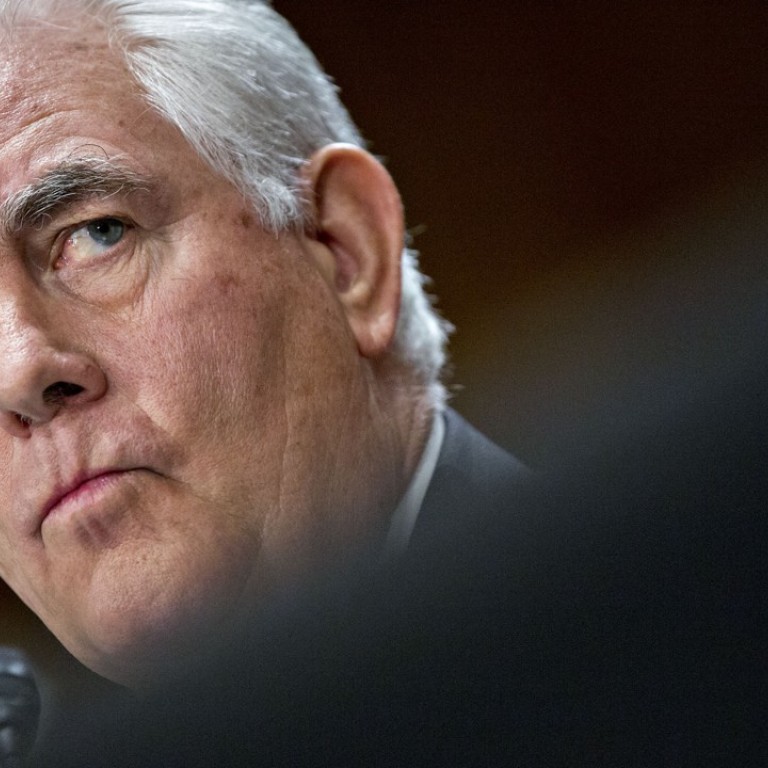
US doubts over one-China linchpin to stalk key Sino-US security talks
US secretary of state says Trump administration intends to keep all its commitments to Taiwan
Renewed US criticism of China’s activities in disputed waters and questions over the sustainability of the one-China policy will set the tone for the Trump administration’s first security and diplomatic dialogue with Beijing next week, analysts said.
Washington would also push for Beijing to maintain the cross-strait status quo in the wake of Panama’s decision this week to switch formal diplomatic ties to Beijing, observers said.
At US congressional hearings on Wednesday, US Secretary of State Rex Tillerson accused Beijing of assertive handling of the South China Sea dispute, saying it could tip the Asia-Pacific towards “an inflection point” for conflict.
Tillerson also urged China to step up pressure on North Korea to rein in nuclear threats.
His remarks coincided with US Defence Secretary Jim Mattis’ pledge to continue with freedom of navigation operations in the South China Sea.
In addition to thorny bilateral issues, North Korea’s accelerated nuclear threat is expected to dominate Wednesday’s bilateral meeting in Washington, which will be co-chaired by Tillerson, Mattis and State Councillor Yang Jiechi.
“We have told them [Chinese officials], ‘You are creating instability throughout the Pacific region that will bring us into conflict; please don’t do that’,” Tillerson said.
Asked if Washington and Beijing could avoid the “Thucydides Trap” – rivalry and potential conflict between a rising power and a ruling one – Tillerson said: “We are at an inflection point in the US-China relationship.”
“They see it; we see it. Our conversations are around how are we going to maintain stability and a relationship of no conflict between China and the United States for the next 50 years,” he said.
In a separate hearing, Tillerson said US President Donald Trump was committed to the one-China policy but intended to keep all US commitments to Taiwan.
“[It] is important as we engage with them [Beijing] that we are able to fulfill our commitments to Taiwan which we have every intention of doing. The question is, is the one-China policy sustainable for the next 50 years?” he said.
Analysts noted that Tillerson’s remarks came as Panama switched its century-long diplomatic recognition of Taipei to Beijing on Tuesday, sending cross-strait ties to a new low.
Renmin University international affairs specialist Pang Zhongying said Tillerson was sending a message to Beijing and Taipei that Washington wanted to maintain the status quo of cross-strait ties for years to come, “which is basically in line with previous US administrations”.
The remarks suggested the Trump administration still believed in a transactional, results-oriented approach towards China, he said.
Christine Hsueh, director of North American affairs at Taiwan’s foreign ministry, welcomed Tillerson’s “rather positive” US stand on ties with the island. “Although [Washington and Beijing] are still discussing whether the one-China policy is sustainable for the next 50 years, the US still has high intentions of abiding by its security commitment to Taiwan,” she said.
But Shen Dingli, from Shanghai’s Fudan University, said Beijing would be agitated by Tillerson’s remarks due to their conflicting strategic interests.
“He is absolutely right that US-China relations are at a critical juncture. For Washington, stability means the status quo across the Taiwan Strait, but this kind of stability is not in Beijing’s interests,” Shen said.
He said that with China’s growing economic and military clout, the top Chinese leadership was considering the previously unthinkable – taking Taiwan back within the next 10 or 15 years.
“It’s part of President Xi Jinping’s Chinese dream and I don’t think Beijing will allow Washington to stand in the way,” he said.
In the hearings, Tillerson also expressed frustration that Chinese businesses and individuals were allowed to help North Korea evade United Nations-led sanctions.
“We have made it clear to them, and we have provided them a list of entities that we believe they need to take action against,” Tillerson said. “President Trump has also been very clear with President Xi that if they either don’t want to take the action or they do not take the action, we will act on our own.”
Mattis also weighed in on Wednesday, calling on Beijing to help rein in North Korea.
“Right now, I think we are seeing assistance from China in dealing with this growing issue,” he said.
“The military options are uniformly very, very tough. They’re very serious and the effort right now, led by Secretary of State Tillerson, under the president’s direction, is to find a diplomatic solution, if there is anything along those lines possible.”
Mattis has asserted that the US’ freedom of navigation exercises in the South China Sea that provoked strong protests from China would not be paused.
“This [exercise] is our policy. We will continue this,” he said.
Zhang Liangui, a North Korea expert from the Central Party School in Beijing, said the remarks by the two US officials showed Beijing and Washington remained divided over how to deal with Pyongyang and particularly whether further economic sanctions should be imposed on North Korea.
Additional reporting by Lawrence Chung in Taipei

